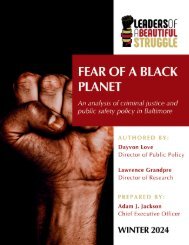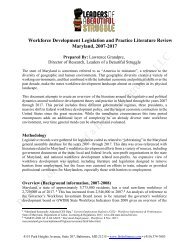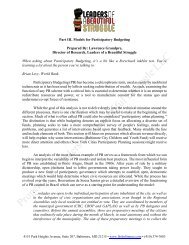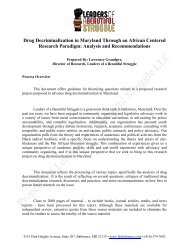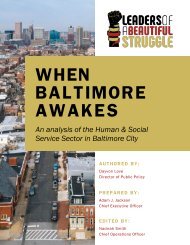The Communal Impacts of Drug Criminalization in Maryland
This project attempts to reframe the harms of drug criminalization. Influenced by African-Centered Research Methodologies, we engaged in a literature review and qualitative research of the communal impacts of drug decriminalization in Maryland, with a specific focus on Baltimore.
This project attempts to reframe the harms of drug criminalization. Influenced by African-Centered Research Methodologies, we engaged in a literature review and qualitative research of the communal impacts of drug decriminalization in Maryland, with a specific focus on Baltimore.
You also want an ePaper? Increase the reach of your titles
YUMPU automatically turns print PDFs into web optimized ePapers that Google loves.
“Black and brown people are be<strong>in</strong>g targeted at higher rates for drug possession and<br />
paraphernalia. One th<strong>in</strong>g we have to combat every day <strong>in</strong> Baltimore, is drugs be<strong>in</strong>g planted on<br />
people and people be<strong>in</strong>g stopped unjustly and searched. People are even be<strong>in</strong>g ticketed and f<strong>in</strong>ed<br />
for hav<strong>in</strong>g cotton or alcohol wipes. <strong>The</strong> police are taken advantage <strong>of</strong> there be<strong>in</strong>g a grey area.<br />
I’m hop<strong>in</strong>g that all drug paraphernalia will be decrim<strong>in</strong>alized and eventually legalized so that<br />
cops can't target Black and brown people like they're do<strong>in</strong>g.” (Monica)<br />
<strong>The</strong> Breakdown <strong>of</strong> Family and Community Bonds<br />
When <strong>in</strong>terviewees were asked how they saw the impact <strong>of</strong> drug use on their community, the core <strong>of</strong> their<br />
concerns was the breakdown <strong>of</strong> community and conditions <strong>of</strong> violence created by the War on <strong>Drug</strong>s and<br />
subsequent policies. <strong>The</strong>ir perspective on the impacts <strong>of</strong> drug use and drug crim<strong>in</strong>alization <strong>of</strong>ten<br />
overlapped with the root causes <strong>of</strong> drug addiction because these factors were <strong>in</strong>tertw<strong>in</strong>ed and fed <strong>in</strong>to one<br />
another <strong>in</strong> a vicious cycle. One <strong>in</strong>terviewee stated:<br />
“So, if we talk about how drug use and drug abuse impacts my community, I would say it<br />
impacts a community sort <strong>of</strong> multi-generationally and the decomposition <strong>of</strong> the Black family<br />
unit. It impacts the family, <strong>of</strong>ten for the <strong>in</strong>dividual that is experienc<strong>in</strong>g the hardship, the<br />
dehumanization process, the further dehumanization process <strong>of</strong> folks <strong>of</strong> African descent,<br />
especially. It impacts the family unit and the <strong>in</strong>dividual's ability to access quality health care.”<br />
(Donna)<br />
<strong>The</strong> <strong>in</strong>terviewee made it clear that the racialized agenda <strong>of</strong> drug policy was to target Black communities<br />
and that it was designed to erode family systems. This was also noted by another <strong>in</strong>terviewee:<br />
<strong>The</strong> dynamics <strong>of</strong> community has changed... When I was grow<strong>in</strong>g up, my mother was home.<br />
<strong>The</strong>re was always that person <strong>in</strong> the community or a couple <strong>of</strong> people <strong>in</strong> the community that<br />
even did daycare <strong>in</strong> the community, watch over, overseers <strong>of</strong> the community, and would watch<br />
children <strong>in</strong> the community. So, there was that collectiveness. But when you then throw addiction<br />
on top <strong>of</strong> that, you throw <strong>in</strong>carceration on top <strong>of</strong> that, you throw <strong>in</strong> the laws that came <strong>in</strong> the<br />
70s where people had a small amount <strong>of</strong> coca<strong>in</strong>e, and they got 25 years. So, when you remove<br />
the family systems, when you break down those systems, this is what we are see<strong>in</strong>g. It’s<br />
impact<strong>in</strong>g everybody.” (Tabatha)<br />
<strong>The</strong> <strong>in</strong>terviewee described how the responsibilities shared among community members <strong>in</strong>clud<strong>in</strong>g<br />
childcare were essential to creat<strong>in</strong>g a sense <strong>of</strong> collectiveness and to build<strong>in</strong>g up the conditions needed for<br />
people to thrive. <strong>The</strong> loss <strong>of</strong> community members to addiction and mass <strong>in</strong>carceration weakened social<br />
networks as described by the concept <strong>of</strong> coercive mobility (Clear 2009). Another <strong>in</strong>terviewee put it:<br />
“<strong>The</strong> ma<strong>in</strong> theme is separation and separation occurs on multiple levels. It's the selective<br />
enforcement <strong>of</strong> crim<strong>in</strong>aliz<strong>in</strong>g drugs. <strong>The</strong>re is an impact <strong>of</strong> racialized and economic trauma so<br />
that it separates society at large, but on the <strong>in</strong>dividual level, it separates relatives from each<br />
other. Because if I'm locked up, I'm removed from society. I'm <strong>in</strong>carcerated. <strong>The</strong>n I have no<br />
physical contact, so there's no hugg<strong>in</strong>g, there's no kiss<strong>in</strong>g good night. <strong>The</strong>re's no wak<strong>in</strong>g up <strong>in</strong><br />
the morn<strong>in</strong>g. <strong>The</strong>re's no physical way <strong>of</strong> transmitt<strong>in</strong>g stories, traditions, family<br />
l<strong>in</strong>eage and family knowledge. And so, there's this tremendous impact <strong>of</strong> separation on the<br />
physical. Also, the separation <strong>of</strong> relationship. I don’t know my uncle because he was<br />
<strong>in</strong>carcerated s<strong>in</strong>ce before I was born. I don’t know my mother because she has been <strong>in</strong> and out <strong>of</strong><br />
halfway homes and recovery houses because its court ordered, or because I’ve been placed <strong>in</strong><br />
foster care.” (J)<br />
Physical separation result<strong>in</strong>g from <strong>in</strong>carceration leads to a breakdown <strong>in</strong> family relationships. This has an<br />
especially deep impact on the ability <strong>of</strong> parents to raise their children.<br />
“<strong>The</strong> crim<strong>in</strong>alization <strong>of</strong> drugs may also <strong>in</strong>clude the foster care system because children are not<br />
there by choice. It serves to separate. It is a tool <strong>of</strong> western and White supremacy <strong>in</strong> all k<strong>in</strong>ds <strong>of</strong><br />
communities, not just <strong>in</strong> Baltimore.” (J)<br />
28 <strong>of</strong> 55




